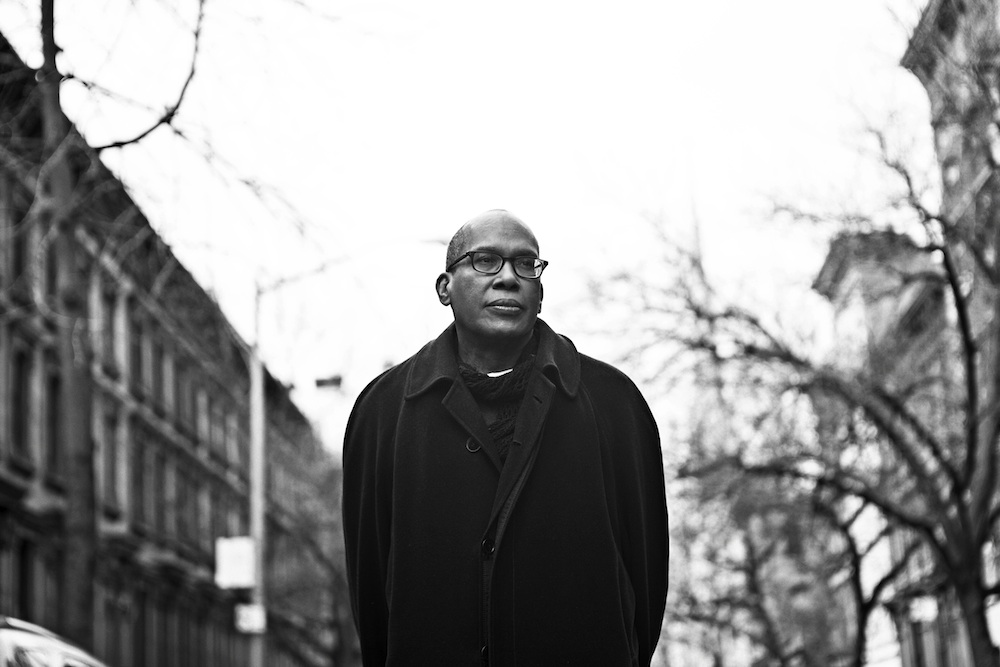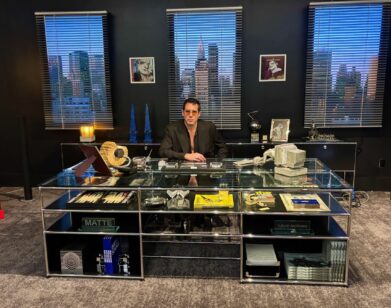Darryl Pinckney

ABOVE: DARRYL PINCKNEY IN NEW YORK, FEBRUARY 2016. PHOTO: VICTORIA STEVENS. GROOMING: ELIZABETH LERMAN/EXCLUSIVE ARTISTS MANAGEMENT USING ANASTASIA BEVERLY HILLS AND BEAUTY BLENDER.
Over the years, Darryl Pinckney has become one of those bellwether writers, where every time a copy of The New York Review of Books is lodged in my mailbox, I instantly open it to look for his byline. Pinckney is a master of that rare essay form; his sentences roll like beautiful prose but they also command, inform, and generally shed a hundred historical and cultural facts.
This spring, the 62-year-old writer released his second novel, Black Deutschland (FSG), a full-blooded, bohemian, cultural, and emotional picaresque about a young, black, gay American named Jed living in West Berlin right before the fall of the Wall. It isn’t so much a coming-of-age tale as a re-becoming—cosmopolitan Europe being that creative escape-hatch for literary American expats. Pinckney, of course, doesn’t simply recreate the Christopher Isherwood Berlin archetype. He invents his own. The thrust of the novel springs the reader between Jed’s nights and days spent looking for love and meaning, and maybe some temporary salvation post-rehab in the divided German capital. “I always loved the sound of my footsteps in Berlin. The Negro in Europe,” the narrator remarks. But that experience is broken up with Jed’s pre-rehab life in Chicago alongside his socially conscientious, upper-class family. It’s a disconnection that isn’t merely geographic. Jed says of his own homosexuality in terms of his mother: “It was she who was putting me off. As a subject, my private life was not reliably housebroken. If I could just not bring Berlin inside, not after she’d gone to the trouble of washing and waxing the difficult, messed-up floors of that part of the house.”
Black Deutschland is by no means an airport read. Every paragraph, every sentence, requires the reader to be on high alert for pleasures, textures, and hard-won insights, and Pinckney dazzles with his gift for every stray detail that builds a volatile city on the verge of total change. “I’d lived my life camping out in other people’s stories, waiting for my own to begin,” Jed reflects. Through Pinckney, it does with a fully living, street-wise charge.
I met up with the writer this past March for lunch in Harlem, not far from where he lives with the poet James Fenton. Cornbread was brought to the table. I think I devoured the entire basket.
CHRISTOPHER BOLLEN: You moved to New York in the early ’70s.
DARRYL PINCKNEY: ’72. And I stayed until the end of ’87. For a combination of reasons I left New York and moved to Berlin.
BOLLEN: Had you been to Berlin before?
PINCKNEY: In the ’80s I would go over the summer—a bit like the main character, although for various reasons I am somewhat older than he is. [laughs] Then a few years later I met my partner [Fenton] in Berlin. He’s British. He’d come from the Far East, where he’d been a correspondent.
BOLLEN: Today, people tend to leave New York to go to Berlin. But was that true in the ’80s as well? You often hear that Berlin now is like New York was in the ’80s.
PINCKNEY: It’s still inexpensive compared to other places in Europe and it’s very hospitable to the young. It still has a scene of which you can feel yourself a part. But my Berlin is the old Berlin now. I don’t know today’s Prenzlauer Berg scene. The hardest thing about Berlin is letting it belong to other people. And now it does. But when I was a student, the connection between Weimar and New York was very strong. Brecht and Weill were being rediscovered, and pretty soon it was Döblin and Fassbinder. Even though Fassbinder was in Munich, Alexanderplatz was a big deal. There was just a very strong connection in the film world between Berlin and the East Village because of particular personalities. One was a guy named Alf Bold, who ran something called the Arsenal Theater in Berlin. He had the entire history of contemporary avant-garde cinema in his head. I remember a lot of his friends lamenting that no one got the chance to interview or record him before he died, because the history of cinema died with him.
BOLLEN: You said there was a combination of reasons you left New York for Berlin. What were they?
PINCKNEY: A lot of things were happening. One part of the Jed story that’s also true is that I’d been to rehab and my parents didn’t know. They never found out. I think the editors of The New York Review knew my parents and figured out how upset they’d be and so they just never told them.
BOLLEN: Were the editors at The New York Review part of the reason you went to rehab?
PINCKNEY: They organized it. It was a friend in Berlin and then a friend here who both said, “You have a problem and now it’s time to do something.” They told Barbara Epstein and she and Elizabeth Hardwick went into action and that was that.
BOLLEN: That’s what a friend does. And you wanted a fresh start so you went to a new city. Some friends I have who’ve been through rehab say how hard it is to come back to the city you were living in pre-rehab. Sometimes it’s better to stay away for a year or two.
PINCKNEY: People, places, and things. For a lot of reasons I had to move.
BOLLEN: Jed doesn’t drink anymore but he certainly smokes. Were you also a smoker in Berlin?
PINCKNEY: When James and I met we smoked the same brand. It was unusual for a white guy to smoke menthols. But by the time I’d gone home for Christmas and gone back to Oxford he’d quit smoking and he didn’t tell me. And he’s never mentioned it! The only thing that stops you is age. My sister was a heavy smoker. So were my parents. My father quit as soon as the Surgeon General’s report came out. But my mother kept smoking. She even smoked during her ballet exercises. She would hold onto the bar and plié with a cigarette dangling.
BOLLEN: Jed’s from Chicago. You’re from Indianapolis. Did you choose Chicago because it has a certain connection to Berlin terms of both being cities of architecture?
PINCKNEY: And psychology. In the 19th century, Berlin was called the German Chicago. Or Chicago was called the American Berlin because they were sort of new cities or new powerhouses.
BOLLEN: How long did you stay in Berlin when you moved there in ’87?
PINCKNEY: Probably three years steadily.
BOLLEN: Did you have a feeling during that time that this would be fertile material for a novel?
PINCKNEY: Unfortunately for me, I was one of these people who took a long time to learn that the material at his feet was fine. I’d waste a holiday trying to set a story in this new place I’d visit, whereas I would never write a story about Indianapolis. But with Berlin, I knew I was someplace different. I didn’t know anyone who thought the Wall would come down. Except Susan Sontag.
BOLLEN: She makes a cameo in Black Deutschland. Did you know her in Berlin?
PINCKNEY: Oh yeah. I knew her a bit here in New York and then in Berlin I saw her quite a bit. She introduced me to James in fact.
BOLLEN: That’s a nice matchmaker to have as part of your history.
PINCKNEY: I know; it was sweet.
BOLLEN: Judging from how precise the details of this novel are you must have been taking diligent notes. It’s one thing to write about a place you just visited, but you’re writing 30 years later about a city that really is nothing like it was then.
PINCKNEY: I had a lot of notes and fragments and observations that never amounted to anything. After the Wall had gone down so many people were writing about Berlin, I didn’t have the same urgency or feel enough authority.
BOLLEN: It’s funny how history can scoop a fiction writer, how an event can make a book obsolete.
PINCKNEY: I was doing a piece with Robert Wilson the night the Wall went down. We were sitting in rehearsals and suddenly we heard it.
BOLLEN: In the book there’s this feeling Jed has of really being an outsider amidst all of the joy and revelry and madness of German national unity.
PINCKNEY: There was very much that feeling. And then of course not so long after, I was in England. Eventually I gave up my sublet in Berlin and stayed in England for a long time—for about 20 years.
BOLLEN: You published your first novel High Cotton in 1992. Black Deutschland is 24 years later. How did it feel to take that kind of break between novels?
PINCKNEY: I was living in paradise in the English countryside. I was happy. I was writing for The New York Review. I was working on a book about African American literature in the 20th century and the thing turned into 900 pages. I’d done some things with Wilson during this time too. Don’t ask me how all those years went by.
BOLLEN: I’m a big fan of your work for the New York Review of Books. Is the writing entirely different for journalism than it is for fiction? Different habits? Different compulsions?
PINCKNEY: Yes. It has to be. When you are writing the kind of criticism you hope you’re writing, everything depends on keeping your calm or your cool. You’re trying to tell someone about something that they may know nothing about. They depend on you to read or interpret as best as you can. When you’re writing fiction it’s a heightened voice. You’re trying to cast a spell, which isn’t the same thing as trying to cast someone into it. You are creating a reality but it’s a different sort of performance. Criticism shouldn’t be a performance that upstages the work it’s talking about.
BOLLEN: That’s important to note because so much criticism does seem intent on upstaging the work. I don’t mind a negative review or harsh criticism but a lot of recent takedowns seem intent on eclipsing their subjects.
PINCKNEY: It’s inflated reputations. You think of someone like Susan who has a very slashing intelligence, but that’s why she’s wonderful. When you reread her, you realize most of her work is made up of celebrations of what she admired. It’s much harder to write about something you like versus something you don’t like. I think at the beginning of one’s writing life, negative reviews are what one does to get attention and stake out your territory. It’s also often a mistake. But in this country writers are still free to make their own mistakes and that’s important.
BOLLEN: You recently wrote a piece on Ta-Nehisi Coates where you trace the battles and clashes between black American writers from one generation to another. So many black American writers end up leaving America and joining that European community of expats. Black Deutschland is, in many ways, a black expat story. What is the appeal of Europe? Why the generational urge to leave?
PINCKNEY: Racism in America. Passing was always understood as an individual solution to a mass problem, and you’d be hard-pressed to find in literature instances of black people exposing another black person as passing for white. A lot of people couldn’t pass for white, but you could in some ways have a more civilized life elsewhere. Blacks going to Europe as an individual solution to a mass problem is older than the Jazz Age. Some went in the 1850s because of the slave laws. William Wells Brown, who wrote a very interesting slave narrative, has a travel book and is in London and looking at Thomas Carlyle on a public bus. Carlyle had written something really nasty about slavery and black people. Brown has his revenge and simply describes Carlyle as he appeared on this kind of public transport system—just a kind of disheveled, nasty-looking old guy. So it’s always been there. It happened again in the ‘60s because of the argument about culture and roots. Europe was a very contentious subject in literature and yet jazz musicians still depended on Europe. Now it’s not such a big deal.
BOLLEN: Cello, Jed’s cousin, also moves to Berlin. She’s a piano prodigy but also a bit of an artistic failure at home, so she re-makes her life in Europe as a black bohemian with a comfortable bourgeois lifestyle.
PINCKNEY: Yes. The history that sort of comes in and out in the book is supposed to suggest some kind of world of black performance. On the one hand Cello is integrated into German society, she is the mother of German children. But she’s got maybe a slightly destructive streak or can’t believe in herself anymore.
BOLLEN: Some people, no matter where they go, rebel. They rebel against what they have, find something new, and then rebel against that new order. They simply can’t allow themselves to be fixed.
PINCKNEY: I was somewhat nervous about seeing her from the outside. But I prefer her to be a figure of endless mystique and a question for Jed himself—even at the expense of a reader’s relationship to her. Maybe she just couldn’t handle the girlfriends that Dram [her husband] had in the end.
BOLLEN: Well, everything is outside to a first person narrator. It’s interesting that Jed is black and gay, and most readers have responded to the black elements of the book. For me, I was thinking about the novel in its relationship to gay fiction. Maybe that’s also a feature of first person. You choose what you connect to or hone in on. Obviously, Jed’s sexuality and race are both important.
PINCKNEY: I’m frankly surprised that people didn’t have nastier things to say about the narrator being this black guy who is trying to go after white guys. I thought people might have thought of it as weird. It had been an issue back in the day. There were a lot of places where black gay guys weren’t allowed in unless they were with a white guy.
BOLLEN: Really? Like gay bars?
PINCKNEY: Yeah. In the ’70s and ’80s in New York. Especially in the ’80s when we suddenly got a kind of class thing going in clubs.
BOLLEN: I wondered if Jed was freer to be gay in Berlin. Was it more accepting of homosexuality in the ’80s?
PINCKNEY: The point of Berlin was that it seemed that only people like you ran the city. You never ran into people who weren’t like you—especially when you lived as that kind of American in Berlin connected to the arts. And because of Robert Wilson, I was able to have a life in Berlin. It gave me a job. I’d first met Bob in New York through a friend named Howard Brookner.
BOLLEN: The filmmaker who did the Burroughs documentary. Brad Gooch’s boyfriend from his memoir Smash/Cut.
PINCKNEY: Yes. So I met Bob again in Berlin and he sent me these pictures and said it was from a show he was doing with David Byrne and Heiner Müller. Unfortunately the last thing Bob had done with Heiner, Heiner couldn’t write the text. He wrote a long letter about why he couldn’t write it and Bob used that letter as the text. It was a big hit, but Bob didn’t want to risk it again. So he asked me if I’d help Heiner with it. It wasn’t all that possible. I chased Heiner from East to West Berlin, small dives to small dives. I loved Heiner. I had the most fascinating conversations with him about Germany. He was wonderful. He wasn’t really a commie, but he certainly was a socialist. By the end of his life he was made miserable by people wanting him to apologize for living so privileged in East Germany because there was a special checkpoint he was allowed to go through and he had an apartment in West Berlin where I lived. He let me live there for nothing. I stayed there with this wonderful actor from the Fassbinder films named Volker Spengler.
BOLLEN: Amazing. I want to ask you about the structure of Black Deutschland, the way we jump back and forth between Chicago and Berlin—I don’t want to say schizophrenically, but it’s almost of two simultaneous first-person minds.
PINCKNEY: Yes, and there are also these introductory bits of each chapter that float towards an omniscient function even though, technically, it’s still in the first person. Jed is speaking from the end or from the present, which allows him to sound like that. For the whole book he is speaking from the end, we just don’t know it until the end. So he can sound like that as he goes along.
BOLLEN: Those beats into history are nice breaks from a single point of view. A single point of view can get claustrophobic.
PINCKNEY: You can get away with anything as long as it works.
BOLLEN: Did you know where the novel was going to end?
PINCKNEY: I knew it was going to move to the Wall. I wanted the writing to evoke a sense of Berlin being this rather inexplicable place where a lot could happen. But a lot of living is still taken up with prosaic matters. It’s not nothing when you’re abroad and you don’t have a washing machine. It’s not like New York where there are laundromats everywhere.
BOLLEN: In terms of the Wall, it’s hard from where we stand now to believe there was this divided western city.
PINCKNEY: Well, it was a much-publicized place. Whereas I don’t think people have much sense of the borders in Jerusalem.
BOLLEN: Or Nicosia in Cyprus, which is still divided. You start and end the book with Christopher Isherwood and a mention of his Berlin book. And, in fact, your novel is haunted by books, by novels, by other stories.
PINCKNEY: Actually, the Berlin Stories is not a model for this book, strictly speaking. But the feeling that Isherwood inspires of being in Berlin is very much a part of this book. It’s meant as a tribute in that way. The odd thing is that Isherwood’s Berlin stuff is his only writing that I’m interested in. I’m not so interested in the other novels or the California stuff.
BOLLEN: Have you ever met Isherwood’s boyfriend, the painter Don Bachardy? He still lives in the wonderful house they shared in Santa Monica. I visited him once.
PINCKNEY: James pointed out that, when they got together, there weren’t that many models for guys that lived together. So if everything seemed a little crazy, it’s because they were figuring it out.
BOLLEN: That’s interesting.
PINCKNEY: There wasn’t the convention like there is now that people were going to get married. People want liberation but as it turned out they also wanted someone to stay home with.
BLACK DEUTSCHLAND IS OUT NOW.






